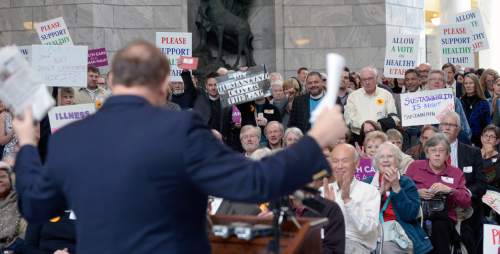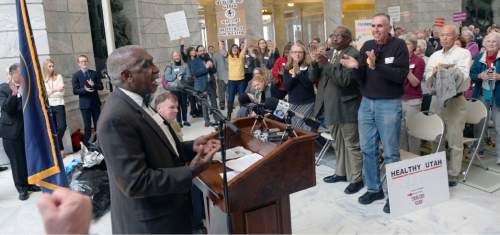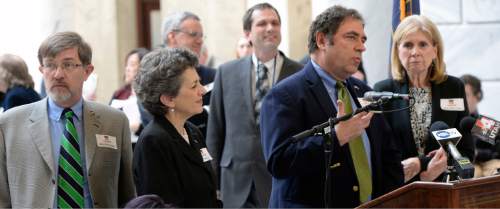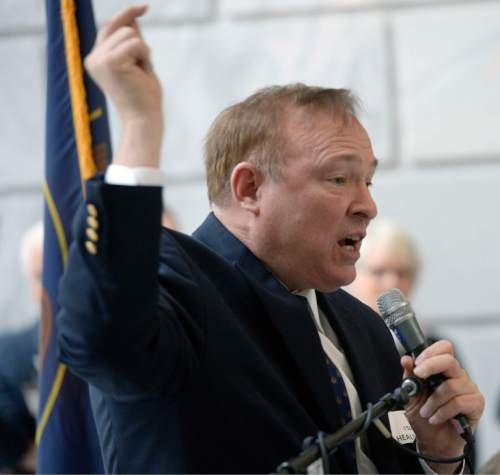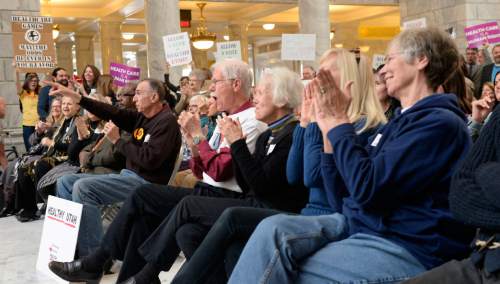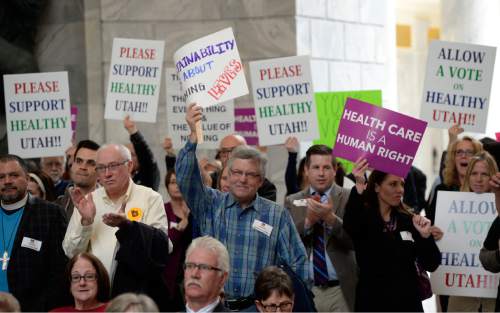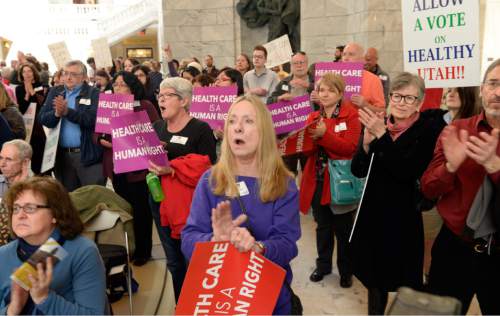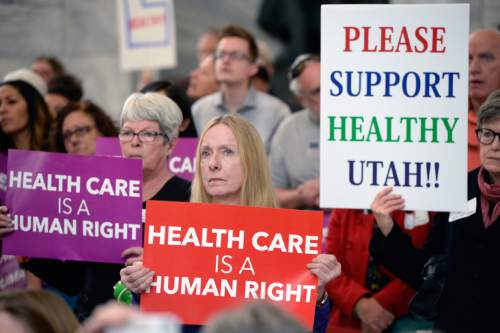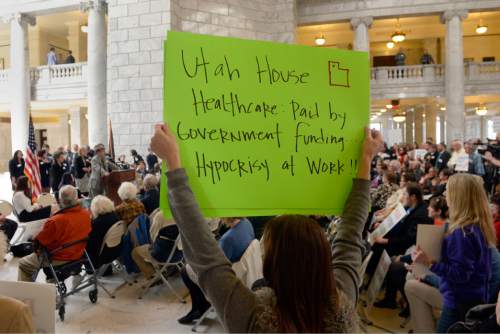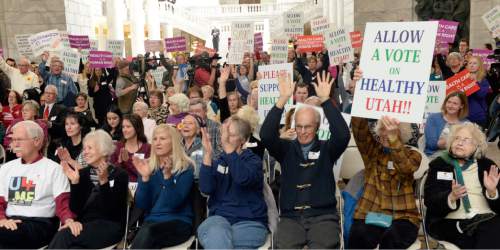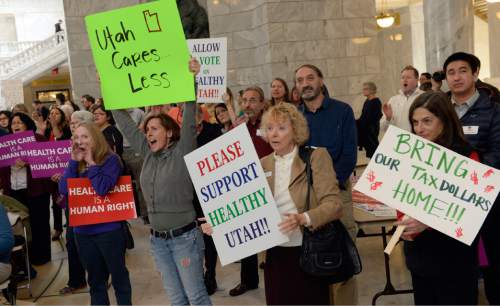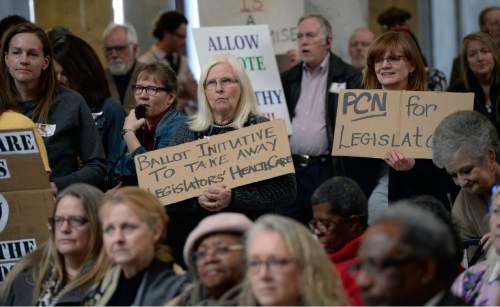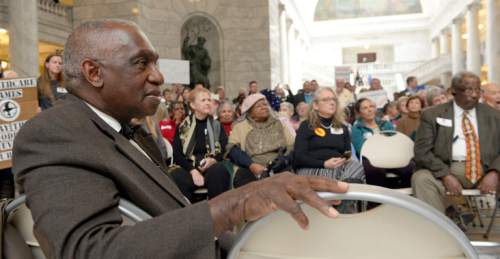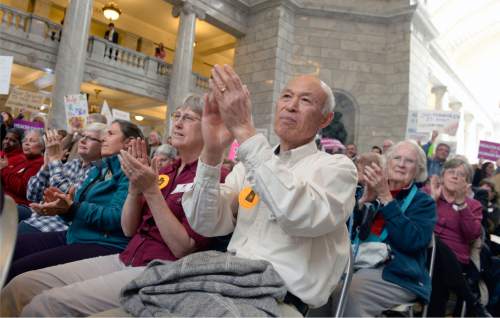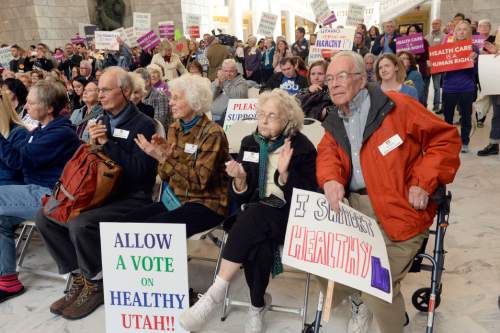This is an archived article that was published on sltrib.com in 2015, and information in the article may be outdated. It is provided only for personal research purposes and may not be reprinted.
Hundreds of Utahns rallied in the Capitol Rotunda Thursday, raising a ruckus they hoped would make the House rethink its rejection of the governor's proposed alternative to Medicaid expansion, Healthy Utah.
They gave a standing ovation to Sen. Brian Shiozawa, who successfully shepherded the bill, SB164, through the Senate only to see it die before the House Business and Labor Committee Wednesday night.
The committee rejected SB164 on a vote of 4-9, but passed HB446, which sponsor House Majority Leader Jim Dunnigan calls Utah Cares, a blend of expanded traditional Medicaid and a bigger Primary Care Network (PCN). Utah Cares would cover all those now in the so-called Medicaid gap, but many with barebones plans.
The House plans to consider Utah Cares on the floor at 11 a.m. Friday.
Healthy Utah would allow those among the poor who are disabled to use traditional Medicaid, but most would get help buying private health insurance.
"I would like this message to go loud and clear through the halls of the House of Representatives and of the Senate," said Shiozawa. The Cottonwood Heights Republican urged the crowd of about 300 to raise their voices to be heard on the floor above.
Sen. Todd Weiler, R-Woods Cross, was another of the dozen or so lawmakers who spoke at the rally. "I don't think the House can hear you," he said. "Can you cheer a little louder?"
Weiler said Utah is already providing medical care for the poor, but in the "most ineffective way possible.
"We're providing it through our prisons and through our emergency rooms."
Logan Republican Rep. Ed Redd, a physician who backed Healthy Utah, was nonetheless boo'd when he suggested Utah Cares deserves support.
Rep. Marie Poulson, D-Cottonwood Heights, a member of the Legislature's Health Reform Task Force, said she is in "serious mourning" because of the committee vote.
"I want a chance to cast my ballot for Healthy Utah," she said, echoing Shiozawa's insistence that the full House ought to hear and debate such an important issue.
Huntsville Republican Rep. Gage Froerer, a member of the Business and Labor Committee, on Wednesday voted for Healthy Utah for just that reason.
"In my nine years, we've discussed a lot of bills, including some that don't deserve it," said Froerer. "This deserves a floor hearing."
Those rallying also heard from Bishop Scott Hayashi of the Episcopal Diocese of Utah and from the Rev. France Davis, pastor of Calvary Baptist Church.
Lawmakers working part time qualify for state health insurance, Hayashi noted.
The Primary Care Network that is the scaffold for Dunnigan's proposal "costs more and you get less," Hayashi said.
Stacy Stanford, a Westminster student whose neurological disorder goes untreated because she lacks insurance, said those like her in the coverage gap "are not trying to be moochers. We're not trying to take anything but what we absolutely need."
Shiozawa and Gov. Gary Herbert both said later they were disappointed by the House committee's decision.
"We knew the fight was lost when it was assigned to that committee," Shiozawa said. "What they turned down was not just the plan itself but [the ability of] the body of the House to even debate and consider this."
House Speaker Greg Hughes, R-Draper, said that he had "nothing to apologize for" in not ensuring a committee outcome that would send Healthy Utah to the floor. "That's the process the Legislature uses and that's what we did."
Utah Cares won't cover the behavioral and mental-health needs of those who go in and out of the criminal-justice system, as Healthy Utah would, so the House is forgoing $19 million in savings there, Shiozawa said.
"We'll run our costs up. We'll run our deaths up," said Shiozawa, a physician. "Now you tell me how that makes sense."
Shiozawa said once Utah Cares passes the House, as expected, the Senate will have to decide whether to adopt it or push for a marriage between it and Healthy Utah.
Utah Cares would be better than nothing, Shiozawa said.
Herbert said it's too early to predict whether he would sign HB446 into law, if it were approved by both houses.
He argues it makes no sense for the House to pass Utah Cares when it would cost $65 million to $77 million in its first two years, while Healthy Utah would cost $25 million. "Where's that money going to come from?" Herbert asked.
Herbert said his plan already has been molded to fit conservative objections in the House. It was trimmed back to two years — hence the name Healthy Utah 2.0 — and the governor has the Obama administration's assurance that the state could cap its costs and grandfather in those still on the plan when it ends in two years.
Utah Cares and Healthy Utah have roughly the same long-range price tag — about $236 million for six years, the governor said.
But Healthy Utah would bring back a net of $2.2 billion in federal funds in those years, helping Utah's economy while providing better care for more low-income Utahns, Herbert said.
The governor's office estimates Healthy Utah would provide coverage for 89,000 people next year and 126,500 the year after that. Dunnigan's plan would cover 46,500 people under the poverty line who have no other coverage in the first year. He has not provided a second-year estimate, but the governor's office says Utah Cares would serve 57,000 in fiscal 2017.
"Healthy Utah is by far the best option we have out there," Herbert said.
Hughes noted, however, that Healthy Utah's assumptions are based on the feds paying 90 percent of the costs after 2020, which Herbert negotiated with the Obama administration. U.S. Rep. Paul Ryan, chairman of the House Ways and Means Committee, told Hughes on Wednesday that such high matches will be the first thing to go in two years, whether a Democrat or Republican is in the White House.
"He told me a 90 percent match is not sustainable," Hughes said.
Twitter: @KristenMoulton


